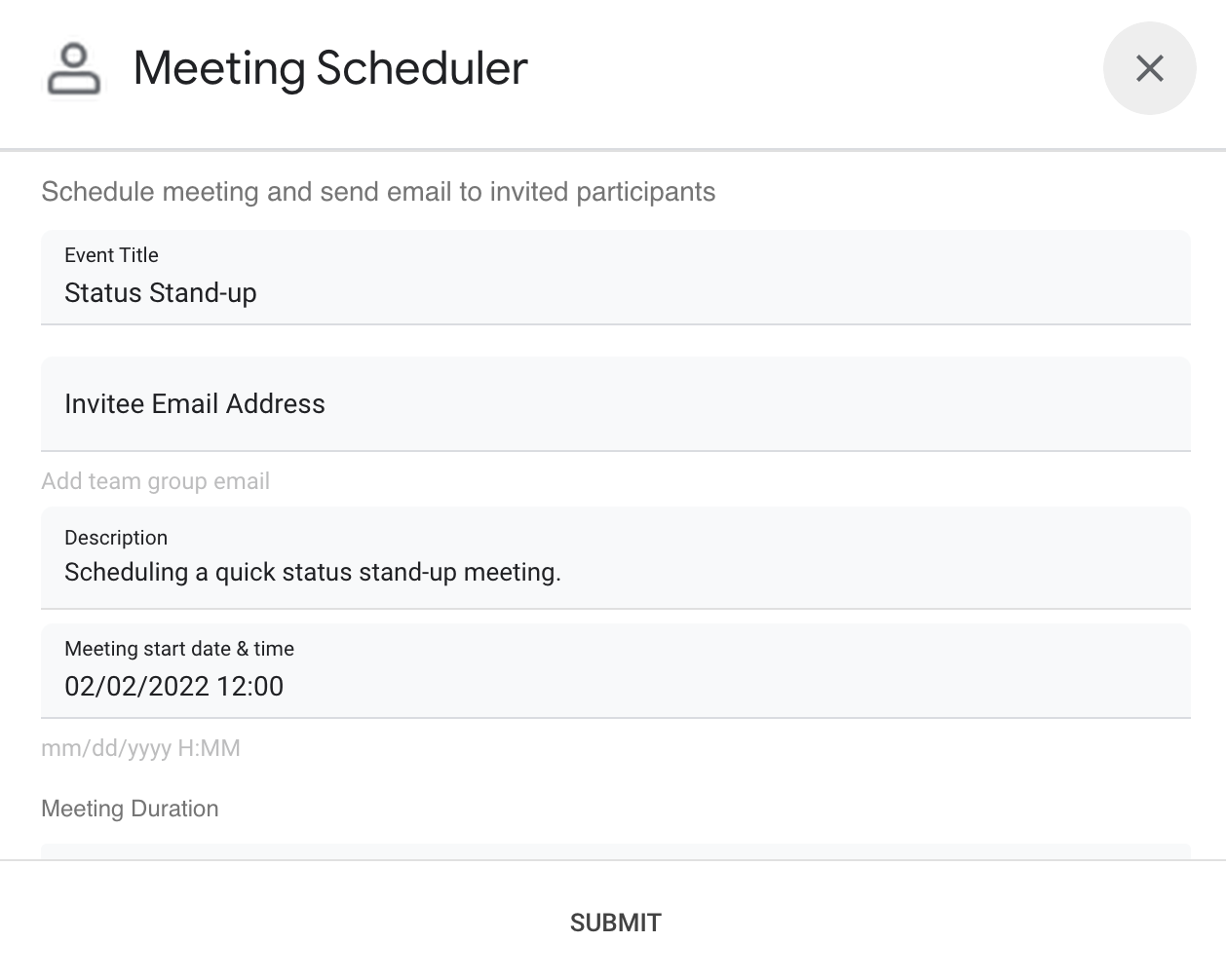Poziom kodowania: średnio zaawansowany
Czas trwania: 25 minut
Typ projektu: aplikacja Google Chat
Cele
- Dowiedz się, co robi rozwiązanie.
- Dowiedz się, jakie funkcje pełnią usługi Apps Script w rozwiązaniu.
- skonfigurować środowisko,
- Skonfiguruj skrypt.
- Uruchom skrypt.
Informacje o rozwiązaniu
Planowanie spotkania w Kalendarzu Google z poziomu wiadomości na czacie lub pokoju w Google Chat. Możesz ustawić szczegóły spotkania, takie jak temat, godzina rozpoczęcia lub czas trwania, albo użyć ustawień domyślnych, aby zaplanować spotkanie natychmiastowe.


Jak to działa
Skrypt aplikacji Google Chat używa poleceń z ukośnikiem i okien, aby uzyskać od użytkowników szczegóły spotkania i zaplanować wydarzenie w Kalendarzu. Skrypt zawiera domyślne ustawienia spotkania, które można dostosować do własnych potrzeb.
Usługi Apps Script
To rozwiązanie korzysta z tych usług:
- Usługa Kalendarz – tworzy wydarzenie w kalendarzu na podstawie podanych informacji o spotkaniu.
- Usługa podstawowa – używa klasy
Sessiondo pobierania strefy czasowej skryptu. Kalendarz używa tej strefy czasowej podczas planowania wydarzenia. - Usługa narzędziowa – formatuje datę wydarzenia w kalendarzu i koduje identyfikator wydarzenia, aby ułatwić uzyskanie adresu URL wydarzenia.
Wymagania wstępne
- Konto Google Workspace w wersji Business lub Enterprise z dostępem do Google Chat.
- Utwórz projekt Google Cloud.
Konfigurowanie środowiska
Otwórz projekt w Google Cloud Console.
Otwórz projekt w Google Cloud, którego chcesz użyć w tym przykładzie:
- W konsoli Google Cloud otwórz stronę Wybierz projekt.
- Wybierz projekt Google Cloud, którego chcesz użyć. Możesz też kliknąć Utwórz projekt i postępować zgodnie z instrukcjami wyświetlanymi na ekranie. Jeśli utworzysz projekt Google Cloud, może być konieczne włączenie płatności za ten projekt.
Włączanie interfejsu API
Zanim zaczniesz korzystać z interfejsów Google API, musisz je włączyć w projekcie Google Cloud. W jednym projekcie Google Cloud możesz włączyć co najmniej 1 interfejs API.Włącz interfejs Google Chat API w projekcie Cloud.
Konfigurowanie ekranu zgody OAuth
Wszystkie aplikacje do obsługi Google Chat wymagają konfiguracji ekranu zgody. Skonfigurowanie ekranu zgody OAuth aplikacji określa, co Google wyświetla użytkownikom, i rejestruje aplikację, aby można ją było później opublikować.
- W konsoli Google Cloud otwórz Menu > > Branding.
- Jeśli masz już skonfigurowany , możesz skonfigurować te ustawienia ekranu zgody OAuth w sekcjach Branding, Odbiorcy i Dostęp do danych. Jeśli zobaczysz komunikat Jeszcze nie skonfigurowano, kliknij Rozpocznij:
- W sekcji Informacje o aplikacji w polu Nazwa aplikacji wpisz nazwę aplikacji.
- W sekcji Adres e-mail pomocy dla użytkowników wybierz adres e-mail, na który użytkownicy mogą pisać, jeśli mają pytania dotyczące ich zgody.
- Kliknij Dalej.
- W sekcji Odbiorcy wybierz Wewnętrzny.
- Kliknij Dalej.
- W sekcji Dane kontaktowe wpisz adres e-mail, na który będziemy wysyłać powiadomienia o wszelkich zmianach w Twoim projekcie.
- Kliknij Dalej.
- W sekcji Zakończ zapoznaj się z zasadami dotyczącymi danych użytkownika w usługach interfejsów API Google i jeśli je akceptujesz, kliknij Akceptuję zasady dotyczące danych użytkownika w usługach interfejsów API Google.
- Kliknij Dalej.
- Kliknij Utwórz.
- Na razie możesz pominąć dodawanie zakresów. W przyszłości, gdy będziesz tworzyć aplikację do użytku poza organizacją Google Workspace, musisz zmienić Typ użytkownika na Zewnętrzny. Następnie dodaj zakresy autoryzacji wymagane przez aplikację. Więcej informacji znajdziesz w pełnym przewodniku Konfigurowanie zgody OAuth.
Konfigurowanie skryptu
Tworzenie projektu Apps Script
- Kliknij ten przycisk, aby otworzyć projekt Apps Script Planowanie spotkań w Google Chat.
Otwórz projekt - Kliknij Przegląd .
- Na stronie przeglądu kliknij Utwórz kopię
.
Skopiuj numer projektu Cloud
- W konsoli Google Cloud kliknij Menu > Administracja > Ustawienia.
- W polu Numer projektu skopiuj wartość.
Ustawianie projektu Cloud w projekcie Apps Script
- W skopiowanym projekcie Apps Script kliknij Ustawienia projektu
.
- W sekcji Projekt Google Cloud Platform (GCP) kliknij Zmień projekt.
- W sekcji Numer projektu GCP wklej numer projektu Google Cloud.
- Kliknij Ustaw projekt.
Tworzenie wdrożenia testowego
- W skopiowanym projekcie Apps Script kliknij Wdróż > Testuj wdrożenia.
- Skopiuj identyfikator wdrożenia Head, aby użyć go w późniejszym kroku, i kliknij Gotowe.
Konfigurowanie interfejsu Chat API
- W konsoli Google Cloud otwórz stronę Chat API.
Otwórz Chat API - Kliknij Konfiguracja.
- Skonfiguruj Chat API, podając te informacje:
- Nazwa:
Meeting Scheduler - Adres URL awatara: dodaj adres URL obrazu o minimalnym rozmiarze 256 x 256 pikseli.
- Opis:
Quickly create meetings. - Funkcjonalność: zaznacz oba pola, aby umożliwić użytkownikom wysyłanie wiadomości bezpośrednio do aplikacji i dodawanie jej do pokoi.
- Ustawienia połączenia: kliknij Apps Script i wpisz identyfikator wdrożenia head.
- Polecenia po ukośniku: dodaj polecenia po ukośniku dla
/helpi/schedule_Meetingwykonując te czynności:- Kliknij Dodaj polecenie po ukośniku i skonfiguruj je, podając te informacje:
- Nazwa:
/help - Identyfikator polecenia:
1 - Opis:
Learn what this app does.
- Nazwa:
- Ponownie kliknij Dodaj polecenie po ukośniku i skonfiguruj je, podając te informacje:
- Nazwa:
/schedule_Meeting - Identyfikator polecenia:
2 - Opis:
Schedule a meeting. - Zaznacz pole Otwiera okno.
- Nazwa:
- Kliknij Dodaj polecenie po ukośniku i skonfiguruj je, podając te informacje:
- Uprawnienia: wybierz Określeni użytkownicy i grupy w Twojej domenie i wpisz swój adres e-mail.
- Nazwa:
- Kliknij Zapisz i odśwież stronę.
- Na stronie konfiguracji w sekcji Stan aplikacji ustaw stan na Dostępna dla użytkowników.
- Kliknij Zapisz.
Uruchamianie skryptu
- Otwórz Google Chat.
- Kliknij Rozpocznij czat .
- Wyszukaj nazwę aplikacji,
Meeting Scheduler. - Wyślij pierwszą wiadomość, np.
hello, aby poprosić o autoryzację. Gdy aplikacja odpowie, kliknij Skonfiguruj i autoryzuj aplikację. Jeśli na ekranie zgody OAuth pojawi się ostrzeżenie Ta aplikacja nie została zweryfikowana, kliknij kolejno Zaawansowane > Otwórz {Project Name} (niebezpieczne).
Wyślij
/schedule_Meetingdo aplikacji.W oknie dialogowym dodaj co najmniej jeden adres e-mail zaproszonej osoby. Możesz zaktualizować inne pola lub użyć domyślnych wpisów.
Kliknij Prześlij.
Aby wyświetlić spotkanie, kliknij Otwórz wydarzenie w Kalendarzu.
Sprawdź kod
Aby sprawdzić kod Apps Script tego rozwiązania, kliknij Wyświetl kod źródłowy poniżej:
Pokaż kod źródłowy
Code.gs
Dialog.gs
Utilities.gs
Dalsze kroki
- Informacje dla deweloperów dotyczące Google Chat
- Tworzenie aplikacji Google Chat za pomocą Apps Script
